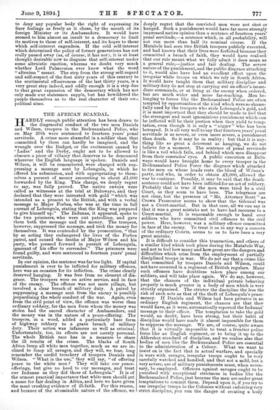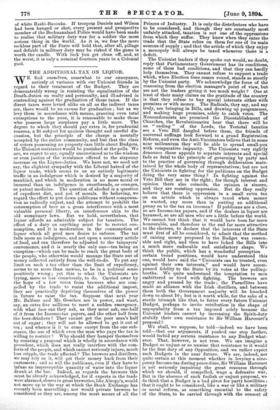THE AFRICAN SCANDAL. n ARDLY enough public attention has been drawn
to the disgraceful conduct of the two men Daniels and Wilson, troopers in the Bechuanaland Police, who on May 29th were sentenced to fourteen years' penal servitude. A crime more shameful in a soldier than that committed by them can hardly be imagined, and the wrangle over the Budget, or the excitement caused by Ladas ' and the Derby, ought not to be allowed to obscure a piece of villainy that deserves to be denounced wherever the English language is •spoken. Daniels and Wilson, it will be remembered, were charged with sup- pressing a message sent by Lobengula, in which he offered his submission, and with appropriating to them- selves a present of money amounting to about £1,000 forwarded by the King. This charge, we deeply regret to say, was fully proved. The native envoys were called as witnesses at the trial at Buluwayo, and they declared that they were intrusted with gold "which was intended as a, present to the British, and with a verbal message to Major Forbes, who was at the time in full pursuit of Lobengula, stating that the King was prepared to give himself up." The Indunas, it appeared, spoke to the two prisoners, who were out patrolling, and gave them both the message and the money. The troopers, however, suppressed the message, and took the money for themselves. It was contended by the prosecution, "that by so acting they endangered the lives of the Forbes patrol, and caused the deaths of Major Wilson and his party, who pressed forward in pursuit of Lobengula, ignorant of his offer to surrender." The prisoners were found guilty, and were sentenced to fourteen years' penal servitude.
In our opinion, the sentence was far too light. If capital punishment is ever to be inflicted for military offences, here was an occasion for its infliction. The crime clearly deserved hanging. It was free from no element of dis- grace. The troopers were on active service, and in face of the enemy. The offence was not mere pillage, but involved a clear breach of military duty. A patrol by suppressing a message sent from the enemy is possibly jeopardising the whole conduct of the war. Again, even from the civil point of view, the offence was worse than ordinary robbery, for the men from whom the money was stolen had the sacred character of Ambassadors, and the money was in the nature of a peace-offering. The troopers, in a word, added a particularly base form of highway robbery to a grave breach of military duty. Their action was infamous as well as criminal. Unfortunately, too, its effects are not kierely personal. The whole British race has in a measure to share the ill results of the crime. The blacks of South Africa lump all white men together, much as we are in- clined to lump all savages, and they will, we fear, long remember the sordid treachery of troopers Daniels and Wilson. "What is the use," they will say, "of offering peace to the white men ? They will take our peace- offerings, but give no heed to our messages, and treat our Indunas as they did those of Lobengula-" It is of the utmost practical importance that white men should get a name for fair dealing in Africa, and here we have given the most crushing evidence of ill-faith. For this reason, and because of the abominable nature of the offence, we deeply regret that the convicted men were not shot or hanged. Such a punishment would have far more strongly impressed native opinion than a sentence of fourteen years' penal servitude,—a sentence which, in all probability, will not run more than half its nominal course. If the Matabele had seen two British troopers publicly executed, and had known that their lives were forfeited because they committed a breach of faith, they would have realised that our rule meant what we fully admit it does mean as a general rule,—justice and fair dealing. The severe nature of the punishment, and the public disgrace attaching to it, would also have had an excellent effect upon the irregular white troops on which we rely in South Africa. It would have taught them that military discipline and military duty do not stop at carrying out an officer's imme- diate commands, or at firing at the enemy when ordered, but are much wider and more far-reaching. Men be- longing to forces like the Bechuanaland Police are often tempted by opportunities of the kind which were so shame- fully used by the troopers who stole Lobengula's gold, and it is most important that they should be made to feel that the strongest and most ignominious punishment which can be inflicted will be their portion when they yield to temp- tation, even though it is only a " nigger " who has been betrayed. It is all very well to say that fourteen years' penal servitude is as severe, or even more severe, a punishment than death. So it may be in reality ; but that it is any- thing like so great a deterrent as banging, we do not believe for a moment. The sentence of penal servitude is like a veil which falls, and behind which men disappear from their comrades' eyes. A public execution at Balu- wayo would have brought home to every trooper in the Bechuanaland Police Force the disgrace which attached to the men on whose heads rests the blood of Wilson's party, and who, in order to obtain £1,000, allowed the war to continue. Possibly, it may be said that the death- sentence could not have been inflicted for an act of robbery. Probably that is true if the men were tried by a civil Court, as they seem to have been. The telegrams are not clear, but the presence of "Mr. Attorney Scott" as Crown Prosecutor seems to show that the tribunal was not a Court-martial. Bat in that case, all we can say is that it was a great mistake not to have had recourse to a Court-martial. It is reasonable enough to hand over soldiers who have committed civil offences to the civil power. Here, however, was a military offence committed in face of the enemy. To treat it as in any way a concern of the ordinary Courts, seems to us to have been a very great mistake.
It is difficult to consider this transaction, and others of a similar kind which took place during the Matabele War, and not to feel bow many and how great are the dangers and difficulties which arise from the employment of partially disciplined troops in war. We do not say that a crime like that committed by troopers Daniels and Wilson, could not have occurred in a regiment of British regulars. Many such offences have doubtless taken place among our soldiers, and will take place again. We do say, however, that the chances of the individual private behaving properly is much greater in a body of men which is very strictly organised. The stricter the discipline the less the risk of such acts as that of the theft of Lobengula's peace- money. If Daniels and Wilson had been privates in an ordinary English regiment, the chances are that they would have, as it were, automatically reported the Indunas' message to their officer. The temptation to take the gold would, no doubt, have been strong, but their habit of discipline would have made it almost impossible for them to suppress the message. We are, of course, quite aware that it is virtually impossible to treat a frontier police force like an English regiment, or to bring it up to the Aldershot standard of discipline, and we realise also that bodies of men like the Bechuanaland Police are essential to the administration of a Colony. What we want to insist on is the fact that in actual warfare, and specially in wars with savages, irregular troops ought to be very carefully watched and handled, and that not a mild, but a very severe, use of military punishments must, when neces- sary, be employed. Offences against savages ought to be punished with exceptional strictness in bodies like the Bechuanaland Police, just because the men are under great temptations to commit them. Depend upon it, if you try to use irregular troops in the Colonies without enforcing very strict discipline, you run the danger of creating a body of white Bashi-Bazouks. If trooper,s Daniels and Wilson had been hanged or shot, every present and prospective member of the Bechuanaland Police would have been made to realise that military duty was for a soldier the most serious thing in the world. As it is, we fear the more reckless part of the Force will hold that, after all, pillage and default in military duty may be risked if the game is worth the candle. With luck you get clean off, and, at the worst, it is only a nominal fourteen years in a Colonial gaol.







































 Previous page
Previous page